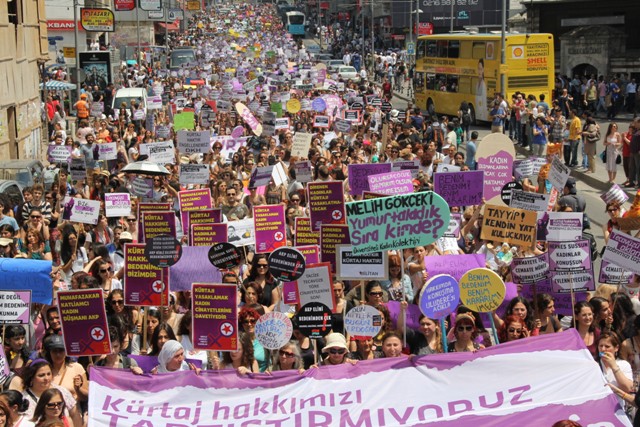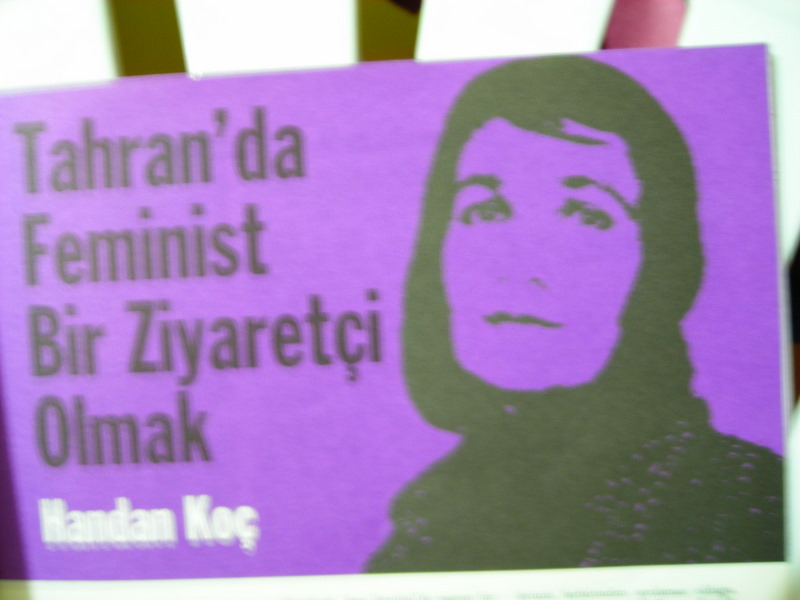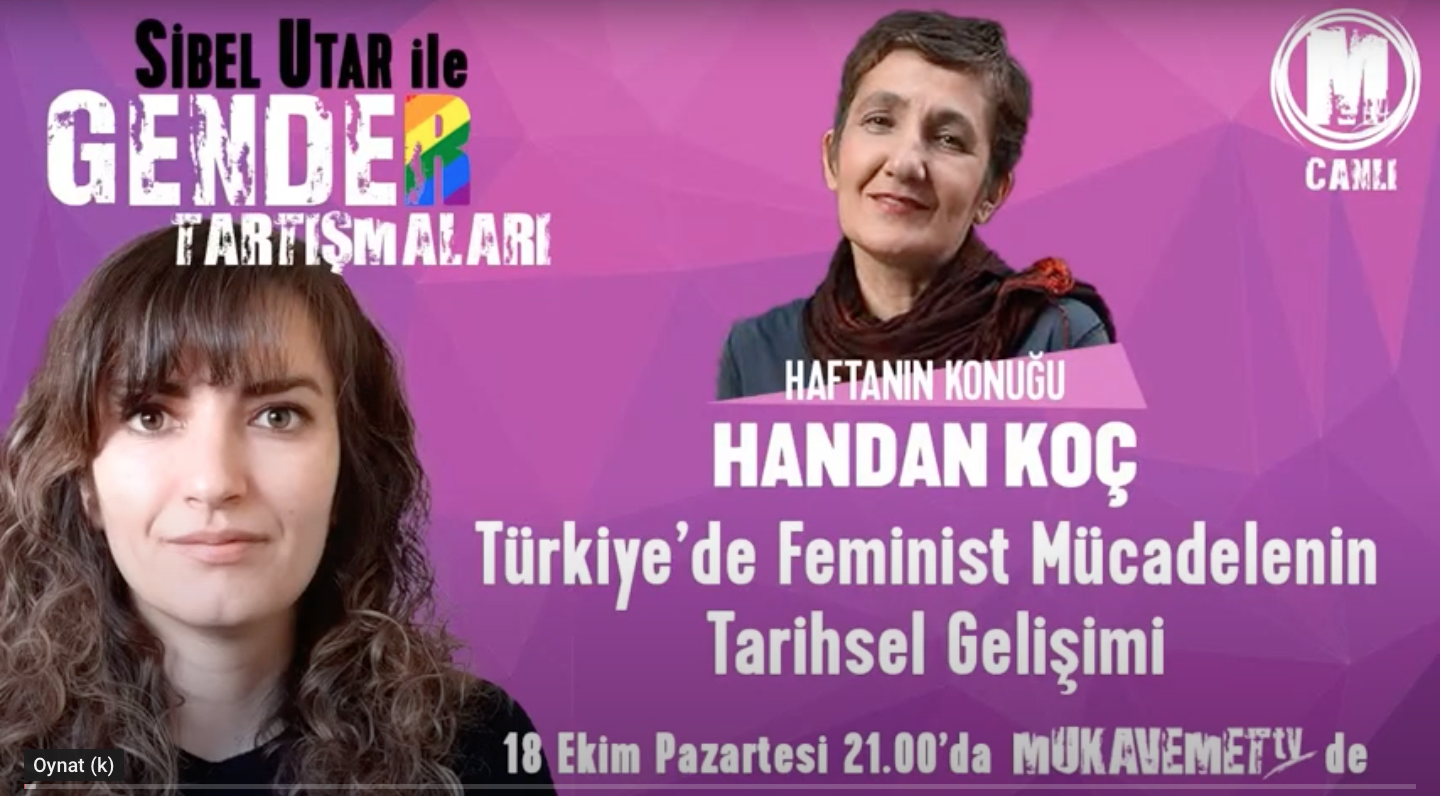Understanding Neoliberalism and New Conservatism in Middle East: Turkey Experience and Prospects for Feminism

WOCMES- World Congress for Middle Eastern Studies
Handan Koç – (ANKARA 2014)
Understanding Neoliberalism and New Conservatism in Middle East: Turkey Experience and Prospects for Feminism
As I was preparing this talk, an important election was held in Turkey. Recep Tayyip Erdoğan, who has been the prime minister for the last twelve years, was elected as president. Along with many other people I was saddened by the results of the election. In 2002, the Justice and Development Party, known as the AKP, declared itself to be a conservative democratic party, breaking away from its classic Islamist roots. Then elected. Was it obvious that there would be negative results in terms of the social politics of gender? It was. But in the beginning, the AKP received encouragement from nearly every segment of society, including the Kurdish and Turkish opposition, as well as liberal-leftist intellectuals. Then in 2007 and 2010, the party expanded its powers through referendums. Starting in 2010, the prime minister reorganized the party changing it into a dictatorial organ… The reasons underlying this critical shift, which occurred within the scope of globalism and capitalism, involve a broad range of issues. And the results brought about are of great significance for women. I would like to discuss these significant issues.
First of all, in Turkey post-modern models of thought support the new conservative male hegemonic thinking, strengthened by Islamism.
Secondly, as feminists, we failed to debate the issue of secularism.
Thirdly we need a local and renewed form of feminism.
I shall discuss these issues, I’m not an academic. From the point of view of philosophy, I place great importance on the dilemma of idealism and materialism. I also place great importance on giving priority to the worldly, tangible cause and effect of everything. I’m talking about materialism in which everything is interconnected and subject to change. I come from the radical feminist school, and share Christine Delphy’s view of women’s situation being shared and based on class.
Overall, I think that progress can be made through two concepts. There are two systems; the first is capitalism, which shapes the lives of all people, including women. Then there is the system of patriarchy, which oppresses and exploits women.
In my talk, I refer to women and men as subjects of feminism. “Woman” is an abstraction in which all women in the world resemble one another. But women, as with all people, can be distinguished along the lines of ethnicity, language, religion, race, class, age, nationality, physical characteristics, sexual preferences, culture, level of education, whether or not they have children, or whether they are from the countryside or the city, and the list could go on. But referring to “woman” as the subject of feminist struggle is not an obstacle to seeing the differences among women or creating meaning in that struggle. But saying gender instead of “woman” and “man” sometimes makes it possible to cover up the social contradictions between the two genders. In the academic world, the idea that the women’s movement and all social phenomena should be “taken up from the point of view of ‘gender’” is broadly accepted. The concept of gender has entered languages as a step forward in the feminist struggles. The aim, both then and today, is to oppose the idea that women’s and men’s roles are innate and unchanging. Men and women are, in terms of biology, different. , Whereas femininity and masculinity are changeable social constructions.
Islamists use the concept “fıtrat” instead of gender… The word “fıtrat” points to the religious idea of “first creation.” This conservative concept points women and men social roles as if they are natural. In Turkey, “fıtrat” is the foundational concept invoked in hegemonic Islamist-conservative discourses against gender and makes the claim that women’s roles are unchangeable. In my opinion, the primary issue in the feminist struggle in Turkey should be against the notion of an immutable fate and “fıtrat”
As you know, for quite a long time Turkey has been under the leadership of conservative right-wing parties. Through the violence of the military coup of 1980, a transition was made to a new economic and political model. Recep Tayyip Erdoğan, however, is different in that he represents an important change. He is the first “Islamist and fascist “head of state to be elected in Turkey… In July of 2012, the women’s movement led protests against the prime minister’s proposal to ban abortions, and that was the first time that feminists protested directly against the government. That protest also rallied against the government’s involvement in the massacre of the Kurdish village of Roboski, because the prime minister was carrying out a smear campaign by saying that abortions were the true massacre, not what happened in Roboski. The largest blow that was dealt to the legitimacy of the AKP and its leader since they came to power in 2002 was the protests in June of 2013. That was a major explosion. Despite the widespread police violence, both women and men took to the streets in massive numbers. It was quite late but the June protests showed that women could unite for various reasons against the patriarchal leader of Islamist conservatism.
Neo-liberalism, conservatism and Islamism are the three pillars of the AKP. İn the last issue of feminist politics Simten Coşar has said that, like every political entity, the AKP is a party in a continual process of being established and created. I agree on that point. And what happened to the role of women in that process? If we look back in time, some points become obvious.
During the rise of Turkey’s Islamist-conservative powers, both the headscarf movement and women were of primary importance. In the 1980’s, there were İslamist women who debated with Islamist men and obtained the right to be actively, vocally political. . The 1980’s were also a time when the spirit of Islamism that was carried over from the 1970’s sought to change all of society. In the 1990’s, women’s votes played a large role in the rise of the classic İslamist party (RP) large numbers of women had a major impact on the re-emergence of traditional patriarchal and religious morals that focused on the private sphere. In the 1980’s, booklets about Islamist rules and principles for daily life brought greater numbers of women into contact with the Islamist rebirth that was happening at the time. Such booklets (ilmihal) were updated and republished. In this way, some women took up a perspective on the world that allowed them to seek shelter against the “immoralities and crises created by modern life,” and this was done through a discourse of Islam. Islamism preached to women the idea that they could change along with their husbands. Such women placed faith in Islamism, believing that it would help them purify their souls and keep their husbands away from alcohol, gambling and prostitutes.
Yasin Durak, in his book the (Emeğin Tevekkülü) ” resignation of labor “carried out a study about the relationship between labor and religion in Konya, and the concept of hegemonic relationships that he used pointed to something that arises when a world view takes on a concrete form in the sense of “shared sensations.” Those can demonstrate in daily life the systematic expression of the interests of the dominant class. We know that traditionally women are exalted to the extent that they submit to male domination. And although tradition and custom are not written down, when women rise up against those customs, punishment awaits them in the form of marginalization, beatings and murder. The feeling of Islamic solidarity, which is the guiding spirit of the new conservatism in Turkey, provides a kind of shelter. Most Islamist women say that by covering themselves, they are protecting themselves from the outside world and the evils that exist there. Because of patriarchy, women have been forced to adhere to the idea that they must make every sacrifice for the sake of family. In the 1980’s, Islamist women employed at universities worked as though they were the holy combatants of a particular world view. Also in the 1980’s, feminism made major strides against male hegemonic morals. I think that Islamist moralism arose as a shield against those efforts which set women free. Today, some of the female leaders of the headscarf movement do not support the AKP. But the new regime of the state that exists today, with its hegemonic Sunni-Islamist understanding of morals, is trying to shape how women live their lives.
Postmodern classification of movements as a problem
In her book The Forbidden Modern, published in Turkey in 1991, Nilüfer Göle wrote that “Islamist movements share the same critical sentiments as other contemporary Western social movements in terms of their position on The Enlightenment . “She argued “ how they respond to issues of identity which were put under pressure by industrial modernization (such as race, gender, nature, ethnicity and religion) and undertake a politics of identity by reviving distant memories, they are similar to civil rights and environmental movements, as well as feminist and ethnic movements. Like feminism, which questions the categorical claims of universality and autonomy and in place of those defends the differences among women; Islamism also problematizes the universality of the category of “civilization” and defends the difference of Islamism)”
Those ideas are a prime example of the kinds of conceptualizations that have arisen in numerous analyses since the 1990s. The effects of this way of thinking have had an impact down to the present day and such popular arguments have been repeated again and again. As we all know, it is difficult to define feminism, and feminists are after a wide variety of things. For instance, they seek both equality and an epistemological break. Women’s bodies and property among many other things have been left to male control both in industrial Western societies and pre-modern societies. As such, feminism does not occupy a position which parallels the same system as Islamism. Feminism may offer up critiques of modernism, but it is not a mere critique of modernism.
Islamists oppose all aspects of western civilization. The first wave of Islamism was preoccupied with finding a means of combining the existing culture with Western industrialization. In this way, Islamists set out to defend Islamism as an aspect of being Muslim. Feminists, in contrast, are opposed to civilizations to the extent that they have seen men as being superior and given them power over women.
Feminism holds the same stance regarding all religions, monotheistic or otherwise, and regarding the ideas of atheism as well. The feminist perspective is concerned with the prescriptions that religions make concerning how women and men live their lives. Feminists also recognize spiritual beliefs and religions aside from those that are monotheistic, and recognize their importance as well. Feminism is also not opposed to the emergence of new religions, while Islamism sees Islam as the last and final religion in the world. Islamist thought prescribes a state of hierarchy between men and women which is based on the division of labor. As with all other monotheistic religions, that ideology is, to put it mildly, sexist.
For feminists, and for each and every woman for that matter, the most important issue is opposing all forms of male dominance and breaking away from the social structures and thoughts that make that dominance possible, as well as resisting the impositions made by men, families and notions of heterosexuality. İn Turkey neither the Islamism that emerged at the beginning of the nineteenth century nor the form that developed in the 1970s and 80s encouraged women to break away from the patriarchal order
That’s why feminists are against hegemonic Islamism; these two movements cannot be classified under the same heading. In saying that, I do not mean that Islamists cannot be feminists or an Islamic feminism is impossible .Of course, Islamist women can become feminists, just as everyone can, and the fact that they would be opposed to male -hegemonic ideas and practices is significant. In the past years in Turkey, there have been women who have attempted to do just that, and feminists have recognized the importance of what they have done. In that way, the limits of what it means to be an Islamist or feminist can be pushed, and perhaps even broken down. And the most important thing is that in the process women themselves will change. But if this is done by prioritizing opposition to the idea of modernism, Islamism and the new conservatism will be the victor, not feminists.
Going back to my quote: , on the one hand there is industrial modernism, which as a form of organization exerts pressure on people; on the other hand, there are those who are placed under that pressure, such as feminists, and Islamists as well. In this situation, industrial capitalism is a fixed constant. For the last few centuries it has remained the same… And while ethnicity, gender, and religion exist in this state of affairs, class does not. The category of woman is reduced to a form of identity. Throughout history, women have always worked for the sake of the people in their households, for their families. This work has only recently been recognized and accepted in the field of economics as labor. The question of whether or not women have been compensated for their labor in the home was first raised by feminists in the 1970’s. Feminists carried out that revolutionary debate together with Marxists, and as a result, there were ideological conflicts that change. As a consequence, feminists led the way for analyses of women’s labor in the home.
Women’s labor has always been exploited by men, bosses, landowners and heads of families. There are certain consequences when feminism is reduced to a critique of modernism. When that happens, the importance of the fact that we, as individuals, as women with independent incomes, disappear. The notion of economic independence becomes meaningless. It makes it impossible to recall that modernism led the way for women to be individuals outside the family. The ideology of enlightenment brought about changes in male hegemony. Industrialization led to the exploitation of women’s labor. But still, industrial modernism made it possible for women to be able to keep the wages that they earned through their labor. Centuries have passed since the emergence of industrial modernism. But it is important to note that this process led to consequences that have been quite different for women and men Did you know that Marie Wollstonecratf’s book was only translated into Swedish 200 years after it was written?
The idea that Europe is a singular totality is strange, just as a totalizing critique or defense of modernism is strange.
To get back to our topic, as I mentioned earlier it has been said that “Islamist movements revive distant memories and undertake a politics of identity, and in doing so, they are similar to civil rights and environmental movements, as well as feminist and ethnic movements.” Of course feminists keep track of the values that women have created in women’s history as well as the pressures to which they have been subjected, tracking down the accounts of women’s history that haven’t been written, the work that has been denied them, and their intelligence and labor that have gone unrecognized. It is problematic that women have not been seen as the subject of modern history, of the history before modernism, of the history of religion and the human race. As for Islamists, it seems to me that in their aspirations they want to return to a time before the emergence of secularism. Does the discomfort that Islamists feel arise because of secularism, which is related to the issue of women as well? This question is of critical importance.
Should women have to choose between secularism and Islamism? In Turkey, in the 1990s, saying “yes” to that question meant that you were on the same side as the state and you were against both the Kurds and Islamists. It meant that because the state had outlawed the Islamists and launched a dirty, bloody war against the Kurds. This duality between secularism and Islamism could not be taken as being separate from these political conflicts. In my opinion, however, for a woman, defending secularism was not the same as the state defending its own actions. Ayşe Böhürler, one of the founders of the AKP and an Islamist writer, went to thirteen Muslim countries in 2006 and made a documentary film about the women living there. During an interview, she said that of the women in all those countries, Turkish women did the most housework. That’s interesting, isn’t it? On the other hand, she said, “Compared to other Muslim countries, in Turkey women’s rights are more developed. Criticize Turkey all you want, but the fact that the country is democratic and has a secular system of law is influential in this regard.” I remember that I read editorials written by Islamist men who criticized her for saying that. In her documentary, Böhürler showed that all the Muslim countries she visited differed from one another. She said that we need to do away with a Western-based perspective and that the only solution for avoiding a block-like perception of Muslim countries is to actually go there and meet the women living there. That idea is just as valid today as it was then. It is quite possible that defenders of women’s rights in developed European countries and North America may see Islam as a disease that needs to be cured or categorize Muslim women as being passive, weak individuals whose lives are marked by submission. Of course, if they think that way it’s because of their lack of knowledge and colonial outlook. To avoid that impasse, perhaps the best way would be to neither accept Islamism as legitimate nor give up on secularism. Being a secular Muslim does not mean that you are not Muslim. In my opinion, thinking otherwise is an example of large-scale political manipulation. We need to find our secular vision and vision of morality for the upcoming time.
The classification of feminisms in middle -east
Margot Bardan, who conducted research on feminism in the Middle East and went on to publish her book Feminism in Islam, is commonly referred to on this issue. She wrote, “Feminisms in the Middle East are more than a century old. There have been two major feminist paradigms, known as ‘secular feminism’ and ‘Islamic feminism. The foundational moment of women’s ‘secular feminism’ may be traced to the late nineteenth century, while the emergence of ‘Islamic feminism’ became evident in the late twentieth.” It is difficult to place Turkey in this classification because in Turkey we can still divide feminism into three time frames.
There were those who lobbied for equality at the beginning of the twentieth century, the second wave which emerged in the 1980’s and the subsequent third wave, which is actually multiple feminisms: the Kurdish feminist movement, trans-feminism, anarcho-feminism, Islamic feminism and the queer movement, among others. It is difficult to explain this complexity to people who have not read sources in Turkish or are unfamiliar with the history of feminism in Turkey, or especially to people who see Turkey as being a Middle Eastern country. It’s simply not possible to grasp the situation by trying to base judgments solely on what has been published in English and other European languages. On this point, it is important that the local dynamics of every country be re-created and passed along, and that applies for feminism as well. Otherwise, influential voices can create barriers made purely of theory that can block out the truth.
Turkey between east-west north-south
As the women’s movement debates gender politics in Turkey along the axis of neo-liberalism and new conservatism, it is critically important to take into account the region in which Turkey is located and especially the geography, politics, economy and religious structures that are particular to Turkey. For Turkish citizens, the question of where Turkey fits into the world is a complex one that has been extensively debated. As is commonly pointed out, Turkey is part of both Asia and Europe. The particulars of patriarchy in Turkey are based as much on Islam as on the ethnic culture of Turks and Kurds. Patriarchal constructs could also be studied in terms of Aegean culture as well. In addition, Turkey has an Armenian, Greek and Jewish population and past. Today, the majority of the population of Turkey may be Muslim, but as Ahmet Yaşar Ocak has said, (Türkler, Türkiye ve İslam) the type of Islam practiced by the people and the Koran-based version of Islam introduced in the fifteenth century, which is based on Sunni Islam, are quite different traditions. On the other hand, the Alevi tradition, a belief which is particular to Anatolia, shares no resemblance with Sunni Arab culture, and the hegemonic sect of the state has always been Sunni, which has at times been quite despotic in its approach to citizens who hold other beliefs. Turkey has borders with Arab countries and some of its citizens have Arab roots. But at the same time, Turkey also borders Christian countries in the east and the west, and Byzantine and Mediterranean traces in patriarchal structures have intrigued scholars. According to the global boundaries that were drawn up during the cold war, Turkey is in the east. It has a military and governmental structure which was designed to combat communism and social uprisings. It has no colonial past and is one of the few predominantly Muslim countries in the world that has a secular civil code of law.
In Turkey, feminism began to fully emerge in the 1980’s. In those years, feminism was critiqued by everyone, from socialists to Islamists, mostly for being a movement with Western roots. There will always be approaches which insist that feminism is a Western construct and will always be that way. Local feminisms were needed in the twentieth century, and they are still needed now. To achieve that, we must be realistic and put a distance between ourselves and hegemonic trends of thought and political conflicts. Why? For the simple reason that the “women problem” can easily be dominated by hegemonic trends. Personally I believe that the Turkish and Kurdish women’s movements have their own particular feminist traditions and strengths. The feminism of Turkey holds to a tradition that prizes women’s search for every possible way to break away from the male hegemonic system. In the upcoming future, I can only hope that we will be able to move forward in this country which is run by a dictator as the rich “north” countries play war games around us.
Kaynaklar:
Christine Delphy…Baş Düşman/ Sel yayıncılık 1999
Simten Coşar ….Feminist Politika 23 Summer 2014
Yasin Durak….Emeğin Tevekkülü / İletişim Yayınları 2011
Nilüfer Göle …Modern Mahrem / Metis Yayınları 1991
Ayşe Böhürler…Behind Walls (Women in İslamic contries) / 2006
(http://arsiv.sabah.com.tr/2006/10/04/cp/gnc112-20061001-102.html)
Margot Badran…Feminism in İslam / One World Oxford 2009
Ahmet Yaşar Ocak….Türkler, Türkiye ve İslam / İletişim 1999




